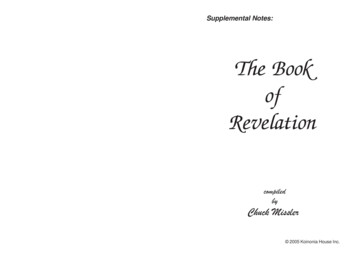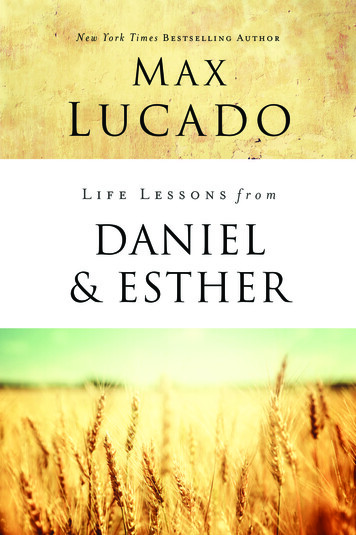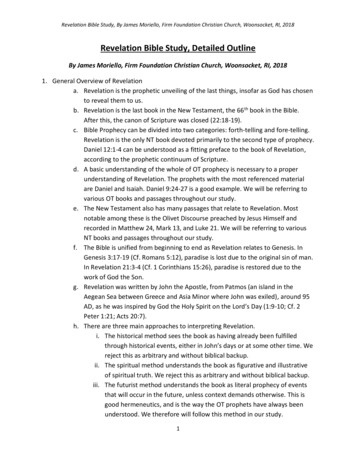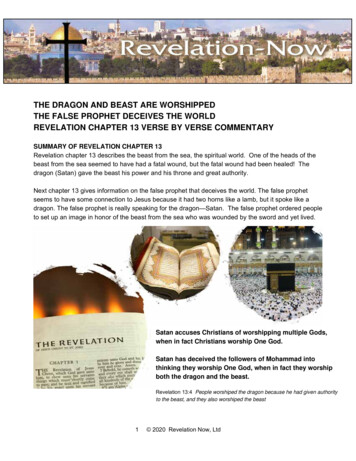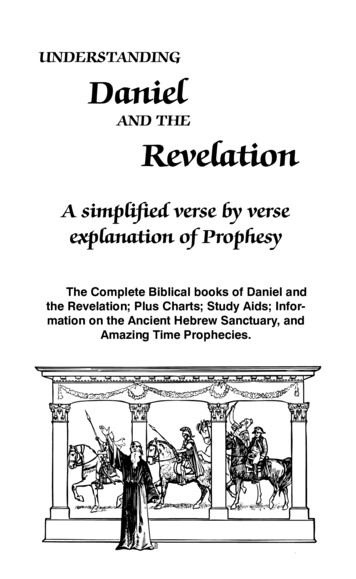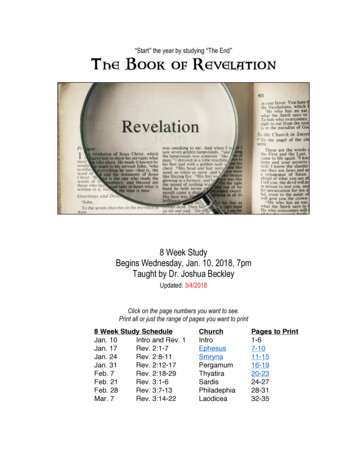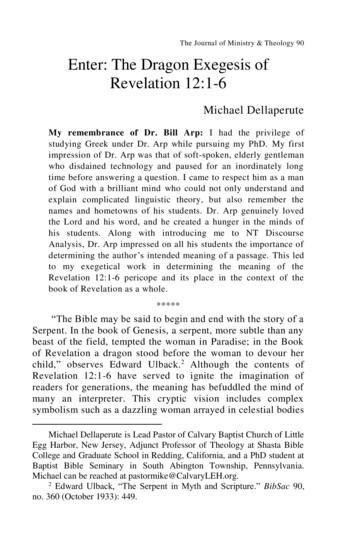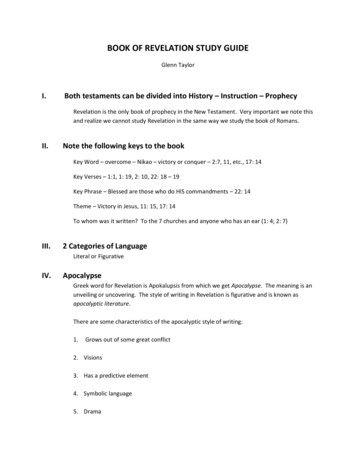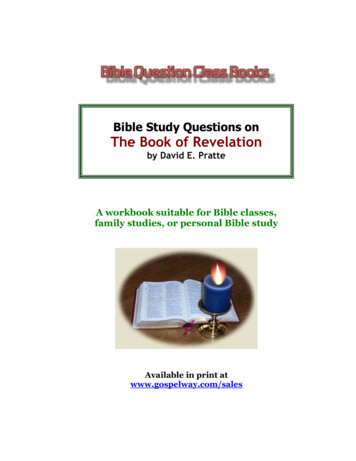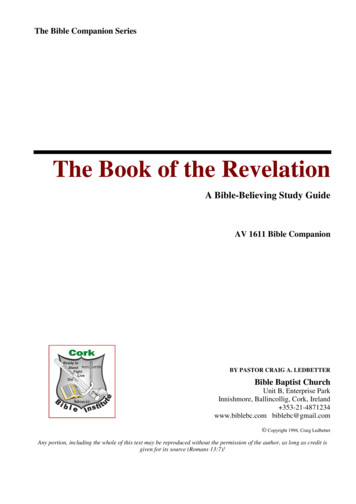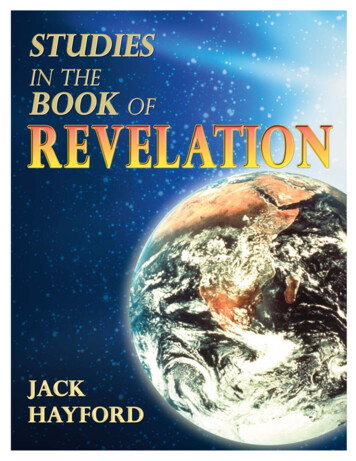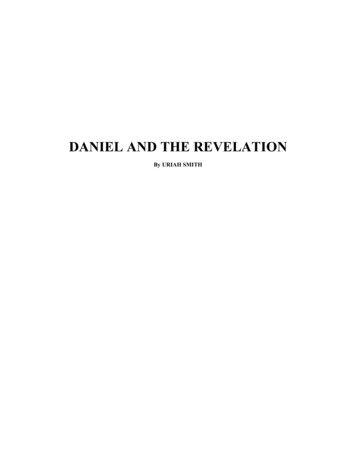
Transcription
DANIEL AND THE REVELATIONBy URIAH SMITH
Daniel and Revelation by Uriah SmithContents1. THE PROPHECIES OF DANIELForewordIntroductionI. A Captive in Babylon's Royal CourtII. The King Dreams of World EmpiresIII. Integrity Tested by FireIV. The Most High RulesV. The Handwriting on the WallVI. Daniel in the Lion's DenVII. The Struggle for World DominionVIII. The World Arraigned Before the Court of HeavenIX. A Prophetic Yardstick Spans the CenturiesX. God Intervenes in World AffairsXI. Unrolling the Scroll of the FutureXII. History's Coming Climax2. THE PROPHECIES OF REVELATIONIntroductionI. The Divine Method of Prophetic RevelationII. The Letters of Jesus to the ChurchesIII. "Behold, I stand at the Door and Knock"IV. Before the Throne of GodV. The Challenge of the Sealed BookVI. Breaking the Seals on the Book of ProphecyVII. The Seal of the Living GodVIII. The Collapse of the Roman EmpireIX. The Moslem World in ProphecyX. The World-Wide Proclamation of the Second AdventXI. The Battle Between the Bible and AtheismXII. The Background of Religious IntoleranceXIII. The Age Long Struggle for Religious FreedomXIV. God's Final Warning to a Wicked WorldXV. Preparing the Vials of Divine WrathXVI. Seven Plagues Devastate the EarthXVII. A World Union of Church and StateXVIII. The Doom of Modern BabylonXIX. King of Kings and Lord of LordsXX. The World's Millennial NightXXI. A New Heaven and a New EarthXXII. Peace at LastReferencesBibliography"We have also a more sure word of prophecy; whereunto you do well that you take heed, as unto alight that shines in a dark place, until the day dawn, and the day star arise in your hearts."2 Peter 1: 19"Believe in the Lord your God, so shall you be established; believe His prophets, so shall you prosper."2 Chronicles 20:202
Daniel and Revelation by Uriah SmithForewordThis volume is devoted largely to tracing the story of God's marvelous dealing with nations andwith notable individuals in fulfillment of the great prophecies of the Bible in the past, but moreparticularly to the unrolling of the prophetic scroll as seen in the stirring events of the throbbing present,and of those impending in the immediate and ominous future. Such events are of the greatest personalsignificance to every man and woman. No one can afford to live in a time like ours without studying thevital issues it has pleased God to open to our understanding in this fast moving age. Such issues haveeternal consequences for every soul. The author of this book lived and wrote more than a century ago, andin the literary and polemic style of those times. His interpretation of prophecy, however, and the doctrinesof truth he established through intensive study of the Scriptures, have borne the test of time and of diligentscrutiny by Bible students. Indeed, they have borne the test so well that they are the more worthy of beingperpetuated in a revised edition, which it is our great pleasure to offer in this present attractive form. Noeffort has been spared by the editors to simplify and clarify the presentation of truth in the fluent andappealing diction of the writer, to verify all historical and exegetical sources drawn upon by the author,and in notable instances to fortify the teaching by new evidence not available at the time of the originalwriting. They have sought also to bring to bear upon prophetic interpretation the additional weight ofsignificance so obviously discernible in political, social, and religious developments pressing upon ourattention in these culminating days of the gospel era. Thoughtful and open-minded consideration of thesevital themes by every candid reader is earnestly invited.THE PUBLISHERS3
Daniel and Revelation by Uriah SmithIntroductionThat the book of Daniel was written by the person whose name it bears, there is no reason todoubt. Ezekiel, who was contemporary with Daniel, bears testimony, through the Spirit of prophecy, to hispiety and uprightness, ranking him in this respect with Noah and Job: "If I send a pestilence into that land,and pour out My fury upon it in blood, to cut off from it man and beast; though Noah, Daniel, and Jobwere in it, as I live, said the Lord God, they shall deliver neither son nor daughter; they shall but delivertheir own souls by their righteousness." Ezekiel 14: 19, 20. His wisdom, also, even at that early day, hadbecome proverbial, as appears from the same writer. To the prince of Tyrus he was directed by the Lord tosay, "Behold, thou art wiser than Daniel; there is no secret that they can hide from thee." Ezekiel 23: 3.But above all, our Lord recognized him as a prophet of God, and bade His disciples understand thepredictions given through him for the benefit of His church: "When you therefore shall see theabomination of desolation, spoken of by Daniel the prophet, stand in the holy place (who reads, let himunderstand), then let them which be in Judea flee into the mountains." Matthew 24: 15, 16.Though we have a more minute account of his early life than is recorded of that of any otherprophet, yet his birth and lineage are left in complete obscurity, except that he was of the royal line,probably of the house of David, which had at this time become very numerous. He first appears as one ofthe noble captives of Judah, in the first year of Nebuchadnezzar, king of Babylon, at the beginning of theseventy years' captivity, 606 BC Jeremiah and Habakkuk were yet uttering their prophecies. Ezekiel begansoon after, and a little later, Obadiah; but all these finished their work years before the close of the longand brilliant career of Daniel. Three prophets only succeeded him, Haggai and Zechariah, who exercisedthe prophetic office for a brief period contemporaneously, 520-518 BC, and Malachi, the last of the OldTestament prophets, who flourished a little season about 397 BCDuring the seventy years' captivity of the Jews, 606-536 BC, predicted by Jeremiah (Jeremiah 25:11), Daniel resided at the court of Babylon, most of the time prime minister of that monarchy. His lifeaffords a most impressive lesson of the importance and advantage of maintaining from earliest youth strictintegrity toward God, and furnishes a notable instance of a man's maintaining eminent piety, and faithfullydischarging all the duties that pertain to the service of God, while at the same time engaging in the moststirring activities, and bearing the weightiest cares and responsibilities that can devolve upon men in thisearthly life.What a rebuke is his course to many at the present day, who, not having a hundredth part of thecares to absorb their time and engross their attention that he had, yet plead as an excuse for their almostutter neglect of Christian duties, that they have no time for them. what will the God of Daniel say to such,when He comes to reward His servants impartially, according to their improvement or neglect of theopportunities offered them?But it is not alone nor chiefly his connection with the Chaldean monarchy, the glory of kingdoms,that perpetuates the memory of Daniel, and covers his name with honor. From the height of its glory hesaw that kingdom decline, and pass into other hands. Its period of greatest prosperity was embraced withinthe limits of the lifetime of one man. So brief was its supremacy, so transient its glory. But Daniel wasentrusted with more enduring honors. While beloved and honored by the princes and potentates ofBabylon, he enjoyed an infinitely higher exaltation in being beloved and honored by God and His holyangels, and admitted to a knowledge of the counsels of the Most High.His prophecy is, in many respects, the most remarkable of any in the sacred record. It is the mostcomprehensive. It was the first prophecy giving a consecutive history of the world from that time to theend. It located the most of its predictions within well-defined prophetic periods, though reaching manycenturies into the future. It gave the first definite chronological prophecy of the coming of the Messiah. Itmarked the time of this event so definitely that the Jews forbid any attempt to interpret its numbers, sincethat prophecy shows them to be without excuse in rejecting Christ; and so accurately had its minute andliteral predictions been fulfilled down to the time of Porphyry, AD 250, that he declared (the only4
Daniel and Revelation by Uriah Smithloophole he could devise for his hard-pressed skepticism) that the predictions were not written in the ageof Babylon, but after the events themselves had occurred. This evasion, however, is not now available; forevery succeeding century has borne additional evidence to the truthfulness of the prophecy, and we arejust now, in our own day, approaching the climax of its fulfillment.The personal history of Daniel reaches to a date a few years subsequent to the subversion of theBabylonian kingdom by the Medes and Persians. He is supposed to have died at Shushan, or Susa, inPersia, about the 530 BC, aged nearly ninety-four years; his age being the probable reason why he did notreturn to Judea with other Hebrew captives, under the proclamation of Cyrus (Ezra 1: 1), 536 BC, whichmarked the close of the seventy years' captivity.5
Daniel and Revelation by Uriah Smith1. A Captive in Babylon's Royal CourtVerse 1 In the third year of the reign of Jehoiakim king of Judah came Nebuchadnezzar king of Babylonunto Jerusalem, and besieged it. 2 And the Lord gave Jehoiakim king of Judah into his hand, with part of thevessels of the house of God: which he carried into the land of Shinar to the house of his god; and he brought thevessels into the treasure house of his god.The Glory Of BablyonThe greatest of ancient cities was Babylon, with its great wall, hanging gardens, and lofty temples.With a directness characteristic of the sacred writers, Daniel enters at once upon his subject. He begins hisbook in a simple historical style. The first six chapters, with the exception of the prophecy of chapter 2,are narrative in content. With chapter 7 we reach the prophetic part of the book.Siege of Jerusalem. Like one conscious of uttering only well-known truth, he proceeds at once tostate a variety of particulars by which his accuracy could be tested. The overthrow of Jerusalem recordedhere was predicted by Jeremiah, and was accomplished in 606 BC[*] (Jeremiah 25: 8-11.) Jeremiah placesthis captivity in the fourth year of Jehoiakim, Daniel in the third. This seemingly discrepancy is explainedby the fact that Nebuchadnezzar set out on his expedition near the close of the third year of Jehoiakim,from which point Daniel reckons. But the king did not accomplish the subjugation of Jerusalem untilabout the ninth month of the year following, from which year Jeremiah reckons. Jehoiakim, though boundfor the purpose of being taken to Babylon, humbled himself and was permitted to remain as ruler inJerusalem, tributary to the king of Babylon.This was the first time Jerusalem was taken by Nebuchadnezzar. Twice subsequently the cityrevolted, but was recaptured by the same king, and more severely dealt with each succeeding time. Thesecond overthrow was during the time of Jehoiachin, son of Jehoiakim, when all the sacred vessels wereeither taken or destroyed, and the best of the inhabitants of were led with the king into captivity. The thirdwas under Zedekiah, when the city endured a formidable siege. During its continuance for a year and ahalf, the inhabitants of the city suffered all the horrors of extreme famine. At length the garrison and theking attempted to escape from the city, but they were captured by the Chaldeans. The sons of the kingwere slain before his face. His eyes were put out, and he was taken to Babylon. Thus was fulfilled theprediction of Ezekiel that he should be carried to Babylon, and die there, yet he should not see the place.(Ezekiel 12: 13.) The city and temple were at this time utterly destroyed, and the entire population of thecountry, with the exception of a few husbandmen, were carried captive to Babylon, in 586 BC.Such was God's passing testimony against sin not that the Chaldeans were the favorites ofHeaven, but that God made use of them to punish the iniquities of His people. Had the Israelites beenfaithful to God, and kept His Sabbath, Jerusalem would have stood forever. (Jeremiah 17: 24-27.) But theydeparted from Him, and He abandoned them. They profaned the sacred vessels by bringing idols into thetemple; therefore God allowed these vessels to be further profaned by letting them go as trophies toheathen shrines abroad.Hebrew Captives in Babylon. During these days of trouble and distress upon Jerusalem, Danieland his companions were nourished and instructed in the palace of the king of Babylon. Though captivesin a strange land, they were doubtless in some respects much more favorably situated than they could havebeen in their native country.Verse 3 And the king spoke unto Ashpenaz the master of his eunuchs, that he should bring certain of thechildren of Israel, and of the king's seed, and of the princes; 4 children in whom was no blemish, but wellfavored, and skillful in all wisdom, and cunning in knowledge, and understanding science, and such as hadability in them to stand in the king's palace, and whom they might teach the learning and the tongue of theChaldeans. 5 And the king appointed them a daily provision of the king's meat, and of the wine which he drank:so nourishing them three years, that at the end thereof they might stand before the king.6
Daniel and Revelation by Uriah SmithHere is recorded the probable fulfillment of the judgments predicted by the prophet Isaiah to KingHezekiah more than a hundred years before. When this king had vaingloriously shown to the messengersof the king of Babylon all the treasures and holy things of his palace and kingdom, Hezekiah was told thatall these good things would be carried as trophies to the city of Babylon, and that even his own children,his descendants would be taken away and be eunuchs in the palace of the king there. (2 Kings 20: 14-18.)The word "children" as applied to these captives is not to be confined to the sense to which it islimited at the present time. It included youth also. We learn from the record that these children werealready "skillful in all wisdom, and cunning in knowledge, and understanding science, and . . . had abilityin them to stand in the king's palace." In other words, they had acquired a good degree of education, andtheir physical and mental powers were so far developed that a skillful reader of human nature could forman accurate estimate of their capabilities. They are supposed to have been about eighteen or twenty yearsof age.In the treatment which these Hebrew captives received, we see an instance of the wise policy andthe liberality of the rising king, Nebuchadnezzar. Instead of choosing means for the gratification of lowand base desires, as too many kings of later times have done, he chose young men to be educated in allmatters pertaining to the kingdom, that he might have efficient help in administering its affairs. Heappointed them daily provision of his own food and drink. Instead of the coarse fare which some wouldhave thought good enough for captives, he offered them his own royal viands. For the space of three yearsthey had all the advantages the kingdom afforded. Though captives, they were royal children, and weretreated as such by the humane king of the Chaldeans.Verse 6 Now among these were of the children of Judah, Daniel, Hananiah, Mishael, and Azariah: 7Unto whom the prince of the eunuchs gave names: for he gave unto Daniel the name of Belteshazzar; and toHananiah, of Shadrach; and to Mishael, of Meshach; and to Azariah, of Abednego.Daniel Taken CaptiveThe youthful Daniel and his companions were taken as captives from their Palestinian home to faraway Babylon. Daniel and His Companions Renamed. This change of names was probably made onaccount of the signification of the words. In the Hebrew, Daniel signified, "judge for God;" Hananiah,"gift of the Lord;" Mishael, "who is what God is;" and Azariah, "whom Jehovah helps." Since these nameshad some reference to the true God and signified some connection with His worship, they were changed tonames which had definitions linking them to the heathen divinities and worship of the Chaldeans. ThusBelteshazzar, the name given to Daniel, signified "prince of Bel;" Shadrach, "servant of Sin" (the moongod); Meshach, "who is what Aku is" (Aku being the Sumerian equivalent of Sin, the name of the moongod); and Abednego, "servant of Nebo."Verse 8 But Daniel purposed in his heart that he would not defile himself with the portion of the king'smeat, nor with the wine which he drank: therefore he requested of the prince of the eunuchs that he might notdefile himself. 9 Now God had brought Daniel into favor and tender love with the prince of the eunuchs. 10 Andthe prince of the eunuchs said unto Daniel, I fear my lord the king, who hath appointed your meat and yourdrink: for why should he see your faces worse liking than the children which are of your sort? Then shall youmake me endanger my head to the king. 11 Then said Daniel to Melzar, whom the prince of the eunuchs had setover Daniel, Hananiah, Mishael, and Azariah, 12 Prove thy servants, I beseech thee, ten days; and let them giveus pulse to eat, and water to drink. 13 Then let our countenances be looked upon before thee, and thecountenance of the children that eat of the portion of the king's meat: and as thou seest, deal with thy servants. 14So he consented to them in this matter, and proved them ten days. 15 And at the end of ten days theircountenances appeared fairer and fatter in flesh than all the children which did eat the portion of the king's meat.16 Thus Melzar took away the portion of their meat, and the wine that they should drink; and gave them pulse.In this record Nebuchadnezzar appears wonderfully free from bigotry. It seems that he took nomeans to compel his royal captives to change their religion. Provided they had some religion, he seemedto be satisfied, whether it was the religion he professed or not. Although their names had been changed tosignify some connection with heathen worship, this may have been more to avoid the use of Jewish namesby the Chaldeans than to indicate any change of sentiment or practice on the part of those to whom these7
Daniel and Revelation by Uriah Smithnames were given.Daniel's Diet. Daniel purposed not to defile himself with the king's food or with his wine. Danielhad other reasons for this course than simply the effect of such a diet upon his physical system, though hewould derive great advantage in this respect from the fare he proposed to adopt. It was frequently the casethat food used by the kings and princes of heathen nations, who were often the high priests of theirreligion, was first offered in sacrifice to idols, and the wine they used, poured out as a libation before theirgods. Again, some of the flesh food used by the Chaldeans was pronounced unclean by the Jewish law. Oneither of these grounds Daniel could not, consistently with his religion, partake of these articles. Hence herespectfully requested the proper officer that from conscientious scruples he might not be obliged to defilehimself.The prince of the eunuchs feared to grant Daniel's request, since the king himself had appointedthe food for Daniel and his companions. This shows the great personal interest the king took in thesecaptives. It appears that his sincere object was to secure in them the best mental and physical developmentthat could be attained. How different is this from the bigotry and tyranny which usually hold supremecontrol over the hearts of those who are clothed with absolute power. In the character of Nebuchadnezzarwe shall find many things worthy of our highest admiration.It is interesting to note what was included in Daniel's request for his diet. The Hebrew word{HEBREW CHARACTERS IN PRINTED TEXT} zeroim, here translated "pulse," is built on the sameroot as the word "seed" in the record of creation, where it mentions "every herb seeding seed," and again,the "fruit of a tree seeding seed." Genesis 1: 29. This makes it clear enough that Daniel's request includedgrains legumes, and fruits. Then, too, if we understand Genesis 9: 3 correctly, the "green herb" itself musthave been included in the diet requests. In other words, the menu for which Daniel asked and which hereceived was made up of cereals, legumes, fruits, nuts, and vegetables a vegetarian diet of good variety,together with the universal drink for man and beast, clear water.The Cambridge Bible, has this note on zeroim: "vegetable food in general; there is no reason forrestricting the Hebrew word used to leguminous fruits, such as beans and peas, which is what the term'pulse' properly denotes."Gesenius gives this definition: "Seed-herbs, greens, vegetables, i.e., vegetable food, such as waseaten in a half fast, opposed to meats and the more delicate kinds of food."A ten days' trial of this diet resulting favorably, Daniel and his companions were permitted tocontinue it during the whole course of their training for the duties of the palace.Verse 17 As for these four children, God gave them knowledge and skill in all learning and wisdom: andDaniel had understanding in all visions and dreams. 18 Now at the end of the days that the king had said heshould bring them in, then the prince of the eunuchs brought them in before Nebuchadnezzar. 19 And the kingcommuned with them; and among them all was found none like Daniel, Hananiah, Mishael, and Azariah:therefore stood they before the king. 20 And in all matters of wisdom and understanding, that the king enquiredof them, he found them ten times better than all the magicians and astrologers that were in all his realm. 21 AndDaniel continued even unto the first year of king Cyrus.Standing For PrincipleWith profound reverence for his God, Daniel purposed in his heart not to defile himself with theking's meat. After Three Years' Study. To Daniel alone seems to have been committed an understanding invisions and dreams. But the Lord's dealing with Daniel in this respect does not prove his companions anyless accepted in His sight. By their preservation in the midst of the fiery furnace they had equally goodevidence of the divine favor. Daniel probably had some natural qualifications that peculiarly fitted him forthis special work.The same personal interest in these individuals heretofore manifested by the king, he stillcontinued to maintain. At the end of the three years, he called them to a personal interview. He must knowfor himself how they had fared, and to what proficiency they had attained. This interview also shows theking to have been a man well versed in all the arts and sciences of the Chaldeans, else he would not have8
Daniel and Revelation by Uriah Smithbeen qualified to examine others in them. Recognizing merit where he saw it without respect to religion ornationality, he acknowledged them to ten times superior to any in his own land. It is added that Daniel"continued even unto the first year of King Cyrus."[*] The date 606 BC is widely supported by Ussher, Hales', and other chronologists, but more recentresearch by archaeologists favors the date 605. This apparently more accurate date, however, in no wayaffects the calculation of prophetic periods presented by the author, for it should be remembered that theJews and other ancients counted both the first and last years of a period. Editors.9
Daniel and Revelation by Uriah Smith2. The King Dreams of World EmpiresVerse 1 And in the second year of the reign of Nebuchadnezzar Nebuchadnezzar dreamed dreams,wherewith his spirit was troubled, and his sleep brake from him.The Course Of EmpiresWith unerring accuracy, the pen of prophecy has traced the course of history down to our day.Daniel was carried into captivity in the first year of Nebuchadnezzar. For three years he was placed underinstructors, during which time he would not of course be reckoned among the wise men of the kingdom,nor take part in public affairs. Yet in the second year of Nebuchadnezzar, the transactions recorded in thischapter took place. How, then, could Daniel be brought in to interpret the king's dream in his second year?The explanation lies in the fact that Nebuchadnezzar reigned for two years conjointly with his father,Nabopolassar. From this point the Jews reckoned, while the Chaldeans reckoned from the time he beganto reign alone on the death of his father. Hence, the year here mentioned was the second year of his reignaccording to the Chaldean reckoning, but the fourth according to the Jewish. [1] It thus appears that thenext year after Daniel had completed his preparation to participate in the affairs of the Chaldean empire,the providence of God brought him into sudden and remarkable prominence throughout the kingdom.Verse 2 Then the king commanded to call the magicians, and the astrologers, and the sorcerers, and theChaldeans, for to show the king his dreams. So they came and stood before the king.The King's Wise Men Fail Him. The magicians practiced magic, using the term in its bad sense;that is, they employed all the superstitious rites and ceremonies of fortunetellers, and casters of nativities,and the like. Astrologers were men who pretended to foretell events by the study of the stars. The science,or the superstition, of astrology was extensively cultivated by the Eastern nations of antiquity. Sorcererswere such as pretended to hold communication with the dead. In this sense, we believe, the word"sorcerer" is always used in the Scriptures. The Chaldeans here mentioned were a sect of philosopherssimilar to the magicians and astrologers, who made natural science and divinations their study. All thesesects or professions abounded in Babylon. The result desired by each was the same the explaining ofmysteries and foretelling of events the principal difference between them being the means by which theysought to accomplish their object. The king's difficulty lay equally within the province of each to explain;hence he summoned them all. With the king it was an important matter. He was greatly troubled, andtherefore concentrated upon the solution of his perplexity the wisdom of his realm.Verse 3 And the king said unto them, I have dreamed a dream, and my spirit was troubled to know thedream. 4 Then spoke the Chaldeans to the king in Syriac, O king, live forever: tell thy servants the dream, and wewill show the interpretation.In whatever else the ancient magicians and astrologers may have been efficient, they seem to havebeen thoroughly schooled in the art of drawing out sufficient information to form a basis for some shrewdcalculation, or of framing their answers in such an ambiguous manner that they would be applicablewhichever way the events turned. In the present case, true to their cunning instincts, they called upon theking to make known to them his dream. If they could get full information respecting this, they could easilyagree on some interpretation which would not endanger their reputation. They addressed themselves to theking in Syriac, a dialect of the Chaldean language which was used by the educated and cultured classes.From this point to the end of Daniel 7, the record continues in Chaldaic, the language spoken by the king.Verse 5 The king answered and said to the Chaldeans, The thing is gone from me: if you will not makeknown unto me the dream, with the interpretation thereof, you shall be cut in pieces, and your houses shall bemade a dunghill. 6 But if you show the dream, and the interpretation thereof, you shall receive of me gifts andrewards and great honor: therefore show me the dream, and the interpretation thereof. 7 They answered againand said, Let the king tell his servants the dream, and we will show the interpretation of it. 8 The king answeredand said, I know of certainty that you would gain the time, because you see the thing is gone from me. 9 But if10
Daniel and Revelation by Uriah Smithyou will not make known unto me the dream, there is but one decree for you: for you have prepared lying andcorrupt words to speak before me, till the time be changed: therefore tell me the dream, and I shall know that youcan show me the interpretation thereof. 10 The Chaldeans answered before the king, and said, There is not a manupon the earth that can show the king's matter: therefore there is no king, lord, nor ruler, that asked such thingsat any magician, or astrologer, or Chaldean. 11 And it is a rare thing that the king requireth, and there is noneother that can show it before the king, except the gods, whose dwelling is not with flesh. 12 For this cause theking was angry and very furious, and commanded to destroy all the wise men of Babylon. 13 And the decree wentforth that the wise men should be slain; and they sought Daniel and his fellows to be slain.These verses contain the record of the desperate struggle between the wise men and the king. Theformer sought some avenue of escape, since they were caught on their own ground. The king wasdetermined that they should make known his dream, which was no more than should be expected fromtheir profession.Some have severely censured Nebuchadnezzar in this matter, as acting the part of a heartless,unreasonable tyrant. But what did these magicians profess to be able to do? To reveal hidden things, toforetell events, to make known mysteries entirely beyond human foresight and penetration, and to do thisby the aid of supernatural agencies. There was therefore nothing unjust in Nebuchadnezzar's demand thatthey should make known his dream. When they declared that none but the gods whose dwelling was notwith flesh could make known the king's matter, it was a tacit acknowledgment that they had nocommunication with these gods, and knew nothing beyond what human wisdom and discernment couldreveal. "For this cause the king was a
Daniel and Revelation by Uriah Smith 3 Foreword This volume is devoted largely to trac
